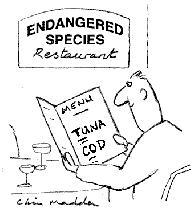
© C. Madden
My friend and colleague at the Centre National de Recherche Scientfique (CNRS), Laboratoire d’Ecologie Systématique & Evolution based at the Université Paris-Sud in France, Dr. Franck ‘Allee Effect‘ Courchamp, has asked me to help him out finding a suitable candidate for what sounds like a very cool job. If you’re in the market for a very interesting and highly relevant conservation post-doctoral fellowship, please read on.
And even if you’re not looking for a position, but are interested in the anthropogenic Allee effect, then by all means, please read on as well.
–
This two-year fellowship is part of a grant focused on demonstrating the novel rarity paradox, either in new wildlife trade markets (i.e., exotic pets, traditional medicine, et cetera) or in newly exploited species (e.g., tibetan antilope, seahorses, et cetera).
The basic principle of this new hypothesis is that, in some economic markets, rare species have a higher value than common species. It can be the case for example with some luxury products (exotic woods, caviar, some furs) or for hobby collections (bird eggs, orchids, seashells). Paradoxically, even activities concerning persons that are interested in biodiversity and its preservation can unknowingly contribute to such an effect: exotic pet owners or ecotourists will both increase their effort to collect/observe rarer species, in both cases impacting the said species, either by direct removal of individuals or by disturbing animals (whale watching, for example). The population declines likely resulting from all these activities will make individuals of the concerned species even rarer, and thus their appeal even larger, thereby driving them into a fatal loop of overexploitation and ultimately, towards extinction.
We work with a combination of empirical analyses, experimental investigation and theoretical approaches within the framework of conservation biology, using tools and concepts from ecology, population dynamics, ecological economics and psychosociology.
The candidate should demonstrate his/her ability and motivation to illustrate this concept with one or several examples, using the approach most suited to his/her skills and experience. A candidate able to work at the interface between ecology and human sciences (e.g., psychosociology or economics) would be most appreciated.
For some more background on the anthropogenic Allee effect research we have been doing in our lab, please visit here.
Details on the grant, the Research Based University Chairs of Excellence Universities of Paris, can be found by clicking that link.
Finally, if you just want to chat with Franck about the position, please e-mail him. But you’d better hurry – the deadline for applications is 30 June 2011!

